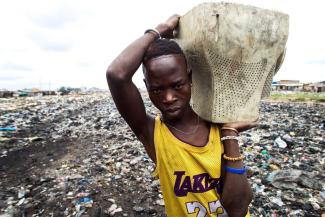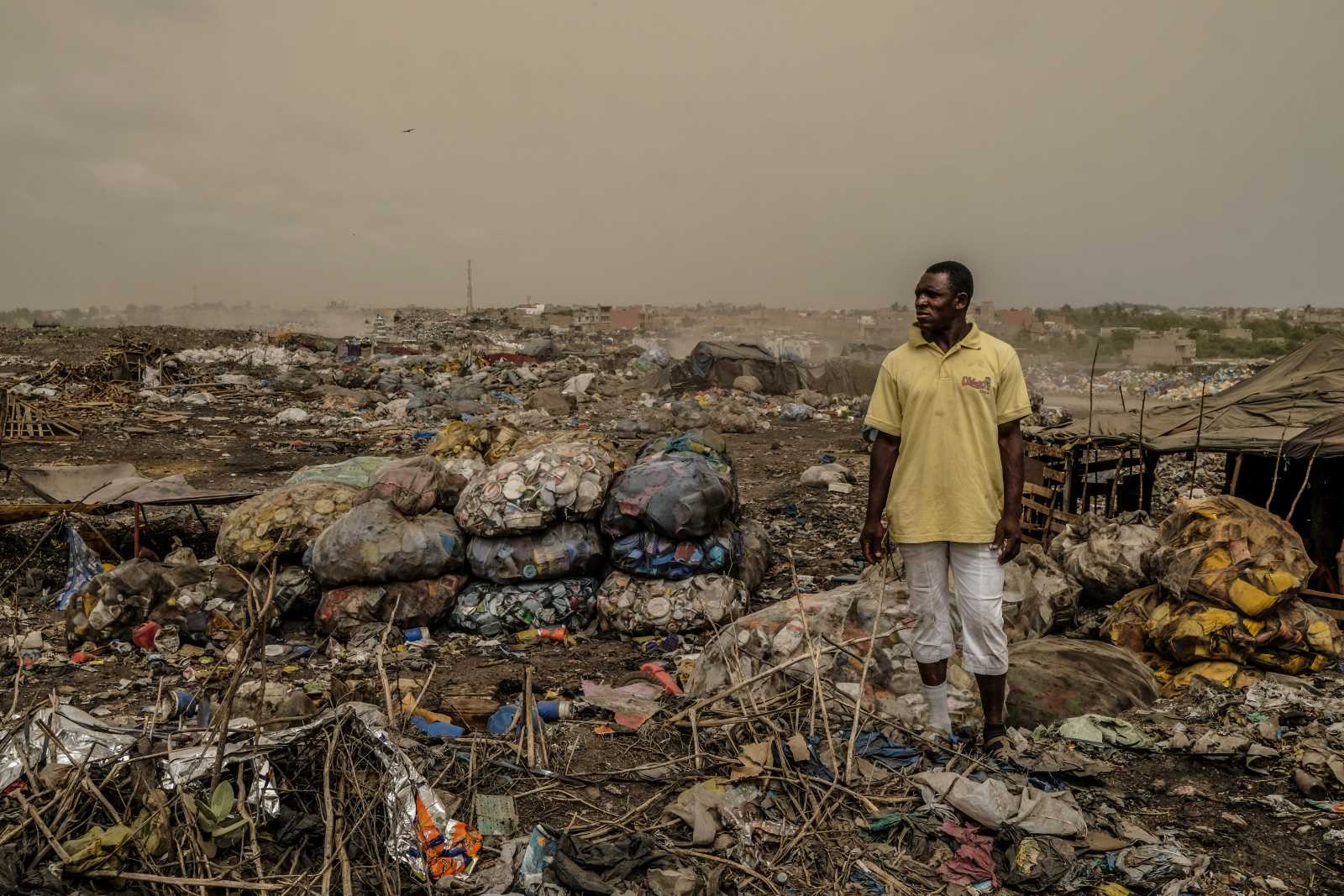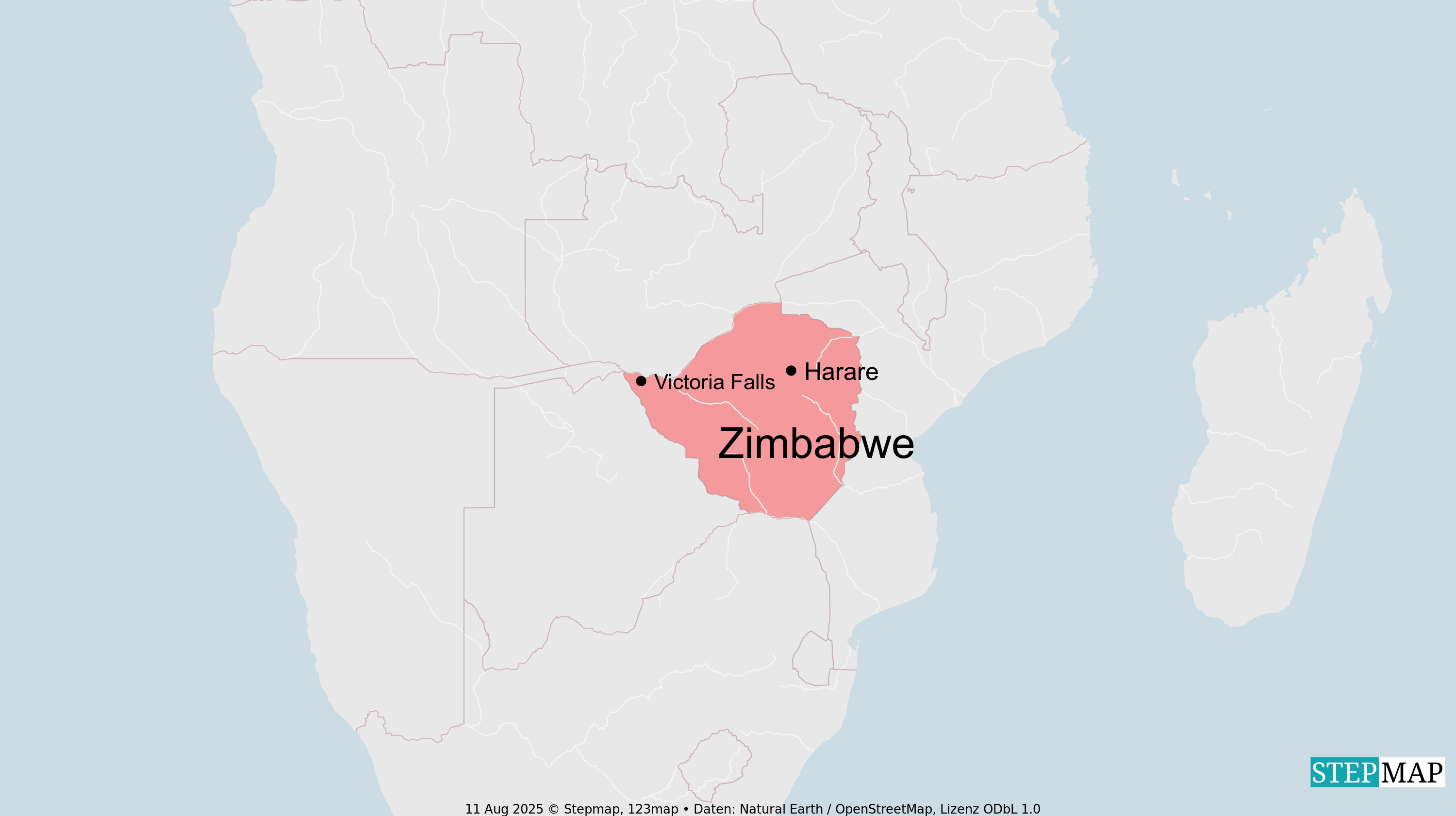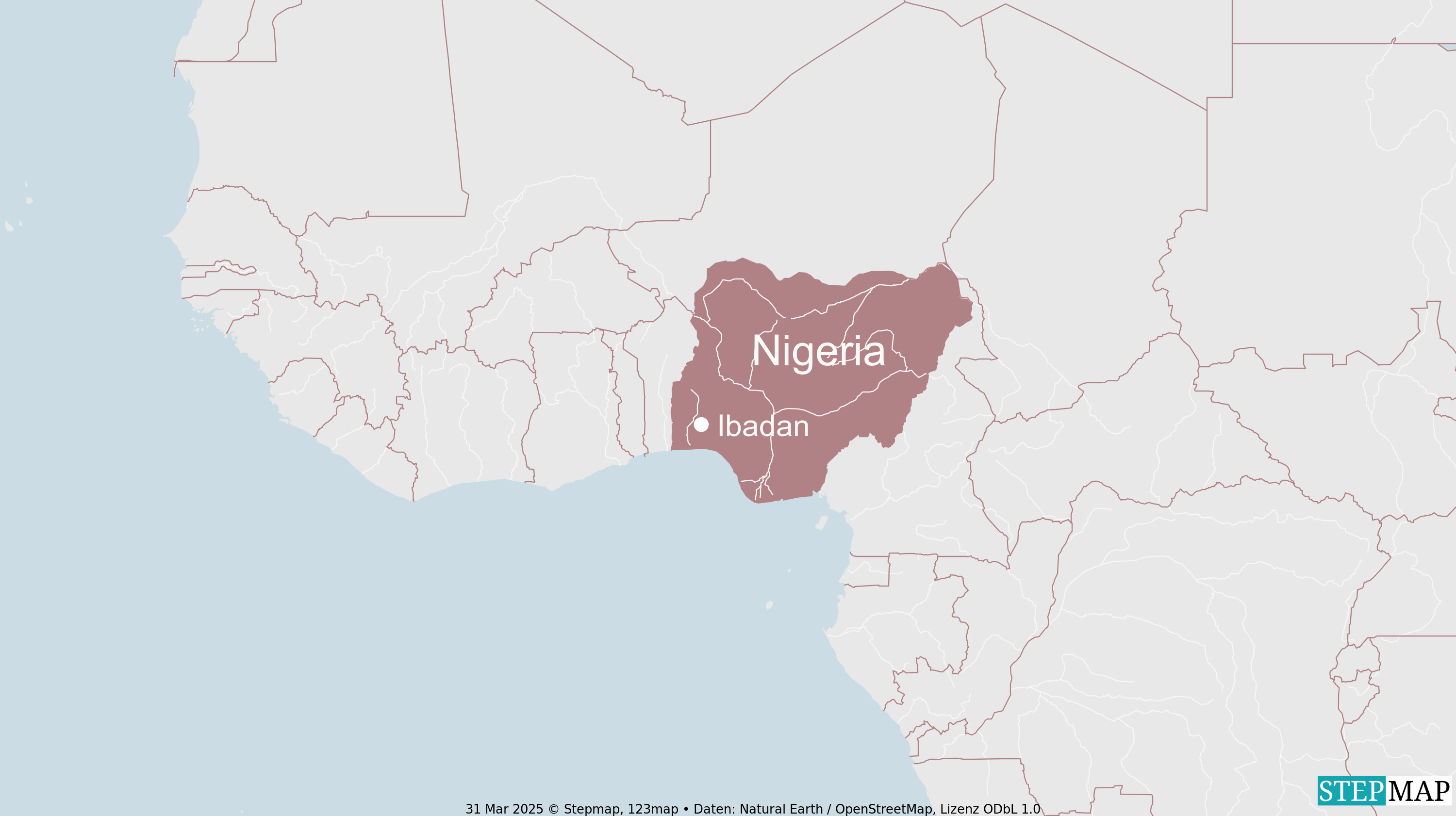Waste exports
The rich countries practice waste colonialism

Part of Europe’s electronic waste lies at the huge Agbogbloshie electronic-waste dump in Ghana. Fires are burning everywhere, sending toxic fumes over mountains of old refrigerators, computers and televisions. “Toxic city” is the name given to the dump that covers 16 square kilometres in Ghana’s capital Accra. An estimated 40,000 people live here.
The fact that it is known that most of the waste is exported from rich countries is largely due to the work of civil-society organisations, which have drawn increasing attention to the issue in recent years. In addition to e-waste, plastic waste is a particular focus.
In target countries, the waste is by no means always recycled, but all too often burned, landfilled or dumped. These practices cause harmful emissions, pollute the water and the soil and leave plastic traces in the entire environment. Various tests of soil and water that Greenpeace has conducted in Turkey have shown how the illegal landfilling and burning of plastic waste from the EU leads to excessive concentrations of substances that are very hazardous to health, such as chlorinated dioxins and heavy metals.
The export of plastic waste is not objectionable in itself. It can certainly be part of regional waste management in border areas. Smaller countries also do not always have access to the entire range of the necessary sorting and recycling facilities and are therefore dependent on exports.
If, however, target countries have lower waste-disposal standards and less developed infrastructure, the risk of improper disposal increases. In these cases, country organisations and multilateral institutions must regulate the shipment of plastic waste more strictly and prohibit export to poorer countries.
The EU, among others, has done too little in this regard. For many years, China was the main recipient of its plastic waste. Since the country largely closed its borders to plastic waste in 2018, however, more waste has remained in Europe, and exports have shifted to Southeast Asia and Turkey.
In 2022, the EU exported 1.1 million tonnes of plastic waste to non-EU countries. Every day over 3 million kilogrammes of plastic waste leave the EU – 31 % goes to Turkey, 16 % to Malaysia, 13 % to Indonesia and nine percent to Vietnam. Great Britain, Australia, Japan and the USA also ship waste to poorer countries.
In addition to these legal waste exports, which are recorded in official statistics, waste is also taken abroad illegally. Reliable estimates of the scale of illegal exports are hardly possible and largely restricted to spot checks on roads and at ports. According to Interpol, however, illegal shipment of plastic waste has sharply increased worldwide as a result of China’s import restrictions.
A practice that harms humans and nature
According to available information, it is mostly commercial plastic waste that is exported to countries outside the EU. However, this field is not very transparent. It lacks monitoring and accountability on the part of waste producers. Besides, intermediaries are often used in waste shipment, which makes exports even harder to trace. It is almost impossible to identify the people responsible for improper or illegal disposal.
The motives of exporting companies vary. To some extent, exports are necessary if the country of origin lacks sufficient recycling capacity. Waste is also exported to save money, however. This is particularly true of plastic waste, which cannot be profitably brought to the recycling market, but instead must be disposed of at the waste generator’s expense.
But even when waste is brought to a recycling facility, the whole input can never be fully salvaged there. Scrap material remains, which then must be disposed of at additional cost. If the recycling facility is located in a country with an underdeveloped disposal infrastructure, there is a high risk that these leftovers will end up in nature or be burnt uncontrolled.
The goal of illegal waste shipment is first and foremost to avoid disposal costs, for instance for incineration. For that reason, waste is purposely falsely declared or hidden in the back of shipping containers.
The European waste sector frequently maintains that these illegal exports are solely responsible for the improper disposal of waste abroad and that stopping this practice will simply require greater monitoring. However, this assessment falls short, because it is also the legal exports that often end up not being fully recycled due to inadequate certification systems at the foreign recycling facilities and a lack of responsibilities and tracking in the destination countries. These systemic deficiencies cannot be overcome by expanding monitoring alone; instead, they demonstrate the need for stricter regulations on waste export.
Current export regulations are inadequate
The “Basel Convention on the Control of Transboundary Movements of Hazardous Wastes and Their Disposal” regulates the export of waste as an international environmental agreement. It has so far been signed by over 180 countries and, since 2019, also contains stricter requirements for the shipment of plastic waste. The EU has adopted some of these regulations. They have been in effect since 1 January 2021 as part of the EU’s waste shipment regulation, which forbids the export of unsorted plastic waste from the EU to countries that are not members of the EU or the OECD. The export of mixtures of various plastics into countries like Malaysia or Indonesia is therefore restricted.
However, exports to OECD countries such as Turkey remain permitted. What’s more, sorted plastic waste can still be exported to any country in the world, provided that the exporting and importing countries agree and that the waste is not classified as hazardous. It’s obvious that existing regulations are not enough to prevent the EU from continuing to outsource part of its plastic waste problem.
Against this backdrop, a tightening of the EU’s waste shipment regulation is currently being discussed. In December 2022, the EU Parliament declared its support for a general ban on the export of plastic waste to non-EU countries. This is a welcome decision. It’s still unclear, however, how member states will position themselves on this issue in the Council of the EU. There are fears that some countries are more likely to go along with the EU Commission’s proposal, which only wants to ban exports to non-OECD countries. Exporting to Turkey would then still be possible.
More transparent systems needed
Furthermore, the question remains to what extent waste shipment within the EU would be more strictly regulated. The present draft of the regulation envisages easing restrictions on the intra-EU export of certain plastics like PVC or PTFE (“Teflon”), which contradicts the Basel Convention. If the EU were to deviate from the global agreement in this regard, it would set an undesirable precedent that other regions could follow. In order not to reduce the effectiveness of the Basel Convention, the EU must adhere to the rules that were agreed on within the global governance regime.
There is also a need for transparent systems with publicly accessible information on all exports and their recycling in the destination country. Digital systems could contribute to better monitoring. Recycling facilities must be regularly subjected to an independent audit. In order to prevent illegal exports, more checks are needed on roads and at ports, for example.
Stricter regulations would have positive effects in both exporting and importing countries. In the latter, they would reduce the disastrous ecological and social consequences associated with the import of plastic waste. Importing countries’ local recycling capacities would also not be taken up by waste from abroad. In exporting countries, on the other hand, there would be greater pressure to prevent waste and expand recycling structures.
It would be an opportunity to establish a global circular economy in which external costs are no longer outsourced to economically disadvantaged countries. The global community must seize this opportunity if it wants to avoid further exacerbating the climate and biodiversity crisis through its waste.
Michael Jedelhauser is a policy officer on circular economy for the Nature and Biodiversity Conservation Union (NABU).
michael.jedelhauser@nabu.de















